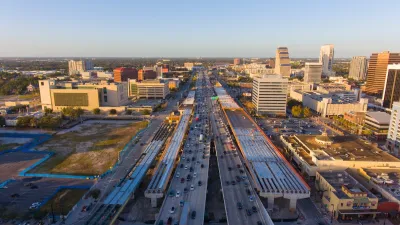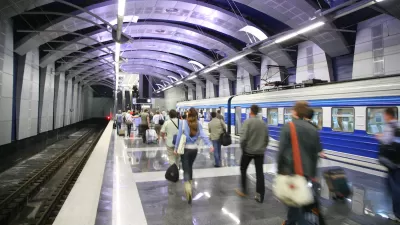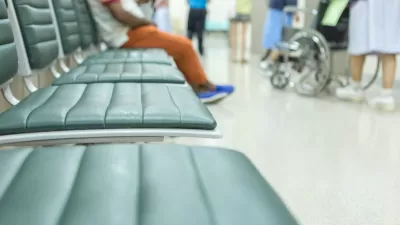The report calls for a wholesale overhaul of U.S. transportation policy to redress the damages caused by decades of auto-centric development.
Divided by Design, a new report from Smart Growth America, highlights the inequities built into the U.S. transportation system and calls for “a fundamental change to the overall approach to transportation.”
Past decisions, including routing the Interstate Highway System through communities of color, dividing and often demolishing them in the process, still shape our built environment. And most importantly, the foundation of the modern transportation program was built on models, measures, and standards with roots in this era.
The report notes that “Because it is difficult and unsafe to reach daily needs without a vehicle in much of the United States, transportation has long acted as an economic barrier in the United States.” Thanks to the perpetuation of car-oriented infrastructure, “Fewer than 10 percent of Americans currently live within walking distance of frequent transit, like buses or metro trains.”
Using Washington. D.C. and Atlanta as examples, the report quantifies the damage created by urban highways and compares it to the different development paths of neighborhoods where planned freeways were never built.
The report calls for sweeping changes in transportation policy. “Small, niche, siloed efforts … cannot repair past damage or keep up with the new barriers being created by new projects. To create a system that serves everyone and halts the practice of benefiting certain people at the expense of others, we need a new set of governing principles, standards, models, and measures, embedded in every single project and program.” According to the report, “Our scales don’t need rebalancing, they need replacing.”
FULL STORY: Divided by Design

Planetizen Federal Action Tracker
A weekly monitor of how Trump’s orders and actions are impacting planners and planning in America.

Congressman Proposes Bill to Rename DC Metro “Trump Train”
The Make Autorail Great Again Act would withhold federal funding to the system until the Washington Metropolitan Area Transit Authority (WMATA), rebrands as the Washington Metropolitan Authority for Greater Access (WMAGA).

DARTSpace Platform Streamlines Dallas TOD Application Process
The Dallas transit agency hopes a shorter permitting timeline will boost transit-oriented development around rail stations.

Renters Now Outnumber Homeowners in Over 200 US Suburbs
High housing costs in city centers and the new-found flexibility offered by remote work are pushing more renters to suburban areas.

The Tiny, Adorable $7,000 Car Turning Japan Onto EVs
The single seat Mibot charges from a regular plug as quickly as an iPad, and is about half the price of an average EV.

Supreme Court Ruling in Pipeline Case Guts Federal Environmental Law
The decision limits the scope of a federal law that mandates extensive environmental impact reviews of energy, infrastructure, and transportation projects.
Urban Design for Planners 1: Software Tools
This six-course series explores essential urban design concepts using open source software and equips planners with the tools they need to participate fully in the urban design process.
Planning for Universal Design
Learn the tools for implementing Universal Design in planning regulations.
Municipality of Princeton
Roanoke Valley-Alleghany Regional Commission
City of Mt Shasta
City of Camden Redevelopment Agency
City of Astoria
Transportation Research & Education Center (TREC) at Portland State University
US High Speed Rail Association
City of Camden Redevelopment Agency
Municipality of Princeton (NJ)





























